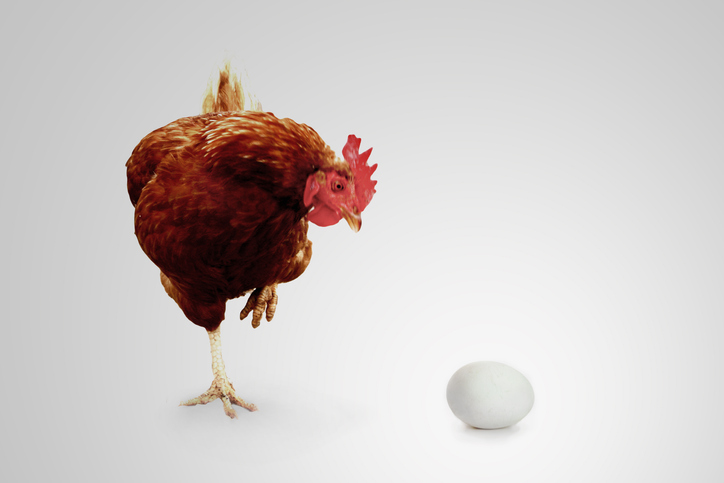Tuesday, 03 March 2020
With over 65 billion birds found globally, the domestic chicken has become one of the most popular livestock species in the world and thanks to its genetic diversity and adaptability, it could be the key to future food security.
The success of the species today is partly due to it being a popular source of protein and its largely successful breeding improvement programmes. The popularity of the domestic chicken can also be attributed to the high level of diversity that enables rapid adaptation to new environments and production systems.
A new study published in BMC Biology is now providing a new light on the origin of domestic chicken diversity.
Genetic diversity is the basis through which organisms adapt, survive and are able to reproduce in a challenging environment. For a domesticate species, like the chicken, it is at the root of their improvement for productivity.
Olivier Hanotte, Professor of Population and Conservation Genetics, in the School of Life Sciences at the University of Nottingham, and senior author of the study, said: “Chickens are one of the most popular species in the world because of its huge genetic diversity. The understanding of the domestication of the species and what makes up its diversity are of key importance. As a result, our research addresses these critical questions, and for the first time, at a genome-wide level.”
In the study, experts give an estimation for the domestication of the species to 8,000 years ago in locations around South and Southeast Asia. It also shows that while the main ancestor of the chicken is the Red Junglefowl, other wild species within the genus, including the Grey junglefowl, Ceylon junglefowl and Green junglefowl, have also contributed to the diversity of chicken, depending on which part of the world it is found in.
The geographic locations and the climatic conditions of the chicken’s domestication centres varies from where the majority of chickens are found in the world today. For instance, over time, chickens have evolved and adapted to diverse ecological conditions including the tropics, temperate, arid and rainforests. They are also known to survive some extreme cases like cold, heat, drought and water scarcity, to name a few.
Dr Raman Akinyanju Lawal, the first author who did the investigation during his PhD study at the University of Nottingham and currently a Postdoctoral Associate at the Jackson Laboratory, Maine in the US, said: “There is a strong disparity in the climatic conditions of today compared to 8,000 years ago when the chicken was first domesticated. We believe that gene flow from other species within the genus contributed to their genetic diversity and survivability.”
 Could chickens be the key to future food security?
Could chickens be the key to future food security?
For thousands of years, chickens have become part of households, serving first as religious/traditional figures and latterly as a source of food. Chicken gestation is 21 days with about 200-300 eggs produced per year for commercial lines. Indigenous village chickens, which are less productive, need less or no resources from humans to survive different environmental challenges.
“Basically, chickens are scavengers, being able to feed and survive by themselves, underscoring the significance of genetic diversity,” says Dr Lawal.
Professor Hanotte says: “By taking advantage of the domestic chicken genetic diversity, which we now know was enhanced which contribution from several species as identified in our study, we can also improve their productivity.”
Dr Lawal explains that as the threat of climate change becomes imminent, the consequences, including famine and increased poverty, will be global. Low income countries will suffer the most. The United Nations has projected that by 2050, the world population will reach 9.7 billion from the current 7.7 billion. The majority of this increase will come from the developing countries.
To deal with the effect of global warming and population expansion, could the answer lie in chickens? For Professor Hanotte and Dr Lawal, the answer is definitively a yes.A full copy of the study - ‘The wild species genome ancestry of domestic chickens’, can be found here.
Story credits
More information is available from Professor Olivier Hanotte, at the University of Nottingham at olivier.hanotte@nottingham.ac.uk; or Dr Raman Akinyanju Lawal at lawalakinyanju@yahoo.com
Notes to editors:
About the University of Nottingham
Ranked 97 in the world and 17th in the UK by the QS World University Rankings, the University of Nottingham is a founding member of Russell Group of research-intensive universities. Studying at the University of Nottingham is a life-changing experience, and we pride ourselves on unlocking the potential of our students. We have a pioneering spirit, expressed in the vision of our founder Sir Jesse Boot, which has seen us lead the way in establishing campuses in China and Malaysia - part of a globally connected network of education, research and industrial engagement.
Nottingham was crowned Sports University of the Year by The Times and Sunday Times Good University Guide 2024 – the third time it has been given the honour since 2018 – and by the Daily Mail University Guide 2024.
The university is among the best universities in the UK for the strength of our research, positioned seventh for research power in the UK according to REF 2021. The birthplace of discoveries such as MRI and ibuprofen, our innovations transform lives and tackle global problems such as sustainable food supplies, ending modern slavery, developing greener transport, and reducing reliance on fossil fuels.
The university is a major employer and industry partner - locally and globally - and our graduates are the third most targeted by the UK's top employers, according to The Graduate Market in 2024 report by High Fliers Research.
We lead the Universities for Nottingham initiative, in partnership with Nottingham Trent University, a pioneering collaboration between the city’s two world-class institutions to improve levels of prosperity, opportunity, sustainability, health and wellbeing for residents in the city and region we are proud to call home.
More news…